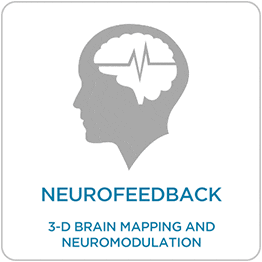Achieving the Best Results with Neurofeedback Therapy Training: Tips from the Experts
Neurofeedback therapy is a safe, non-invasive, and pain-free treatment option which provides the brain with feedback signals to help teach self-control. This approach is often recommended to individuals who are suffering from different types of neurological disorders. Neurofeedback therapy training has been known to improve their brain functions. It is an effective therapy that uses real-time monitoring of brain activity to provide visual and auditory feedback to help retrain the brain.
Check out some tips on our neurofeedback therapy program to help you or your loved one achieve the best results:
Choose a qualified and experienced therapist:
Neurofeedback therapy requires specialized training and expertise. It's important to choose a therapist who is licensed and has experience working with the specific condition being treated.
Be patient:
Neurofeedback therapy typically requires multiple sessions to see significant results. Consistency and persistence are key to achieving the best outcome.
Maintain a healthy lifestyle:
A healthy lifestyle, including a nutritious diet, regular exercise, and adequate sleep, can help support the brain's function and improve the effectiveness of neurofeedback therapy.
Communicate openly with your therapist:
It's important to communicate openly with your therapist about any concerns or questions you have about the therapy. This can help ensure that the therapy is tailored to your specific needs and goals.
Be prepared for changes:
Neurofeedback therapy can lead to changes in behavior, mood, and cognitive function. It's important to be prepared for these changes and to have a support system in place.
At Serin Center, our team of licensed therapists provides customized neurofeedback therapy training methods to help individuals with a range of neurological disorders, including ADHD, anxiety, depression, and PTSD. We have state-of-the-art technology and techniques that help our clients get better and ensure they achieve the best possible results.
10 Benefits for Optimal Brain Health
Neurofeedback Therapy
Also known as EEG Biofeedback, is a non-invasive treatment that can improve brain function and reduce symptoms of various mental health disorders. It uses real-time feedback to train the brain to function more efficiently, allowing for better control over thoughts, emotions, and behaviors. Here are ten benefits of neurofeedback therapy:

Reduces Symptoms of Anxiety and Depression
Neurofeedback therapy can help regulate brain activity to alleviate symptoms of anxiety and depression. It can also help reduce the need for medication, making it a safe and effective alternative treatment option.
Neurofeedback Therapy Improves Attention and Focus
Neurofeedback therapy can improve attention and focus by training the brain to stay in a focused state for longer periods of time. This can be particularly helpful for individuals with ADHD or other attention-related disorders.
Enhances Memory and Cognitive Function
By training specific brainwaves associated with memory and cognitive function, neurofeedback can improve overall brain function, leading to better memory and cognitive performance.
Neurofeedback Therapy Reduces Symptoms of PTSD
Neurofeedback therapy can reduce symptoms of post-traumatic stress disorder (PTSD), such as flashbacks, nightmares, and hyperarousal. By training the brain to regulate its own activity, neurofeedback can help individuals better manage their symptoms.
Neurofeedback Therapy Improves Sleep Quality
Neurofeedback therapy can improve sleep quality by training the brain to produce the right types of brainwaves during sleep. This can be particularly beneficial for individuals with insomnia or other sleep disorders.
Reduces Symptoms of Chronic Pain
Neurofeedback therapy can reduce symptoms of chronic pain by training the brain to produce more alpha waves, which can reduce pain perception.
Enhances Athletic Performance
Neurofeedback therapy can enhance athletic performance by training the brain to enter a state of focused relaxation, which can help athletes perform at their best.
Neurofeedback Therapy Improves Mood
By regulating brain activity, neurofeedback therapy can improve mood and reduce symptoms of mood disorders such as bipolar disorder.
Neurofeedback Treats Addiction
Neurofeedback therapy can be an effective treatment for addiction by helping to regulate the reward centers of the brain, reducing cravings and promoting healthy behaviors.
Improves Overall Brain Health
Neurofeedback therapy can improve overall brain health by training the brain to function more efficiently. This can lead to improved cognitive function, better emotional regulation, and overall better quality of life.
3-D Brain Mapping and Typical Neurofeedback Sessions
Before beginning neurofeedback therapy, a 3-D brain map is created using a non-invasive EEG to identify areas of the brain that may be overactive or underactive. This map is used to develop a personalized treatment plan that targets specific areas of the brain.
Number of Neurofeedback Therapy Sessions
The number of neurofeedback therapy sessions required varies depending on the individual and the specific condition being treated. On average, most individuals require 20-30 sessions to see lasting results. Sessions typically last between 30-60 minutes and are conducted 1-2 times per week.

Recommended Treatment for:
Common Questions About Neurofeedback Therapy
Serin Center experts have been utilizing applied neuroscience to enhance the lives of children, adolescents, adults, families, and executives with effective and innovative therapy.
Get to experience the power of innovative and effective applied neuroscience therapy for your emotional and mental well-being. You may visit our clinics in Peoria, AZ, and Scottsdale, AZ, for our experts to provide you with cutting-edge approaches for faster, long-lasting results. See how we can help upgrade your life when you contact us today.
